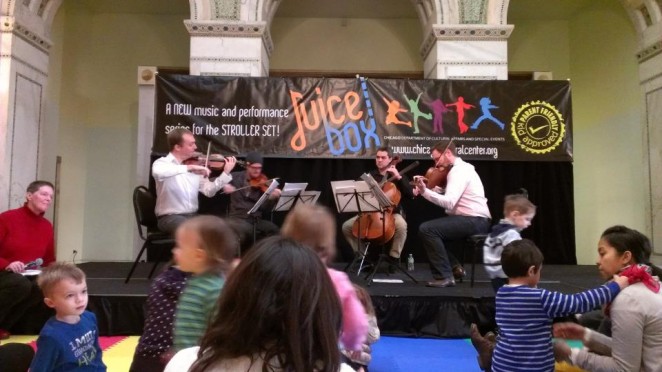Norman Lebrecht, of the blog Slipped Disc, was kind enough to show interest in our experiences at Juicebox and asked for some thoughts about the experience. Here's what Doyle shared:
3-year-olds love Elliott Carter…at least the 3-year-olds found scurrying beneath the iconic Tiffany dome of Preston Bradley Hall on Friday morning. Chicago’s Department of Cultural Affairs and Special Events (DCASE) has launched a fresh new series with the intention of immersing toddlers and their caregivers in contemporary music, dance and theatre, cleverly titled "Juicebox," and Spektral Quartet is thrilled to have been the lead-off ensemble. We are also still wiping Cheerios dust off our strings.
What seems clear to DCASE, and certainly to our quartet, is that listeners have to be taught to bristle or sneer at certain flavors of music. Take Carter's Quartet No. 2, which tends to elicit some of the more emphatic responses, from ecstatic to cynical, from our audiences. We've developed larger-than-life character descriptions for each instrument's role, a self-composed play synopsis for the movements, and had open conversations with each other about the piece in front of the audience prior to performing it in an effort to create a foothold for first-time listeners. This has been encouragingly successful. On the other hand, tell toddlers, "This piece is awesome," play it with gusto, and their response is, "THIS PIECE IS AWESOME!"
For our Juicebox debut, Spektral excerpted Thomas Adès's Arcadiana, Hans Thomalla's Albumblatt, and Marcos Balter's Chambers in addition to the Carter. With the help of Spektral violinist Austin Wulliman's mother Phyllis, who translated our ideas into Toddler, we approached each composer as an explorer. Adès explores the alchemy of painting into sound: parents here rocked with their children back and forth during the fog-veiled gondola ride of Arcadiana's first movement. Thomalla explores the sounds around him in everyday life: violinist Aurelien plays the bariolage measures, likening it to an ambulance siren, and dozens of tiny eyes widen. Balter explores the world as if through a microscope: Phyllis encourages the children to look skyward, and has them pick out a tiny snowflake from among the myriad details of the brilliant, colored glass dome. Finally, the fourth movement and conclusion of Carter's each-instrument-as-independent-character masterpiece is introduced as four people all talking simultaneously, not listening to each other until the second violin reins in the proceedings and restores order. After all, what's a kid's concert without an under-the-radar morality lesson?
At a concert of Mozart for (primarily) septua- and octogenarians the previous evening, one well-intentioned but concerned gentleman asked, "Tonight you're playing for an enthusiastic group of old people who love this music. Who comes to your other shows?" Spektral Quartet has been focused on breaking the fourth wall since its inception, commandeering bars as performance spaces and experimenting with seating the audience up-close, encircling the quartet. We've also prioritized playing works by emerging and local composers, so we were able to respond confidently that our audience is young and open-eared.
Ultimately, it can be distilled down to this: bypassing the need for "un-learning" preconceptions about new music is why the Juicebox series is a powerful artistic venture, and one we will continue to support.


